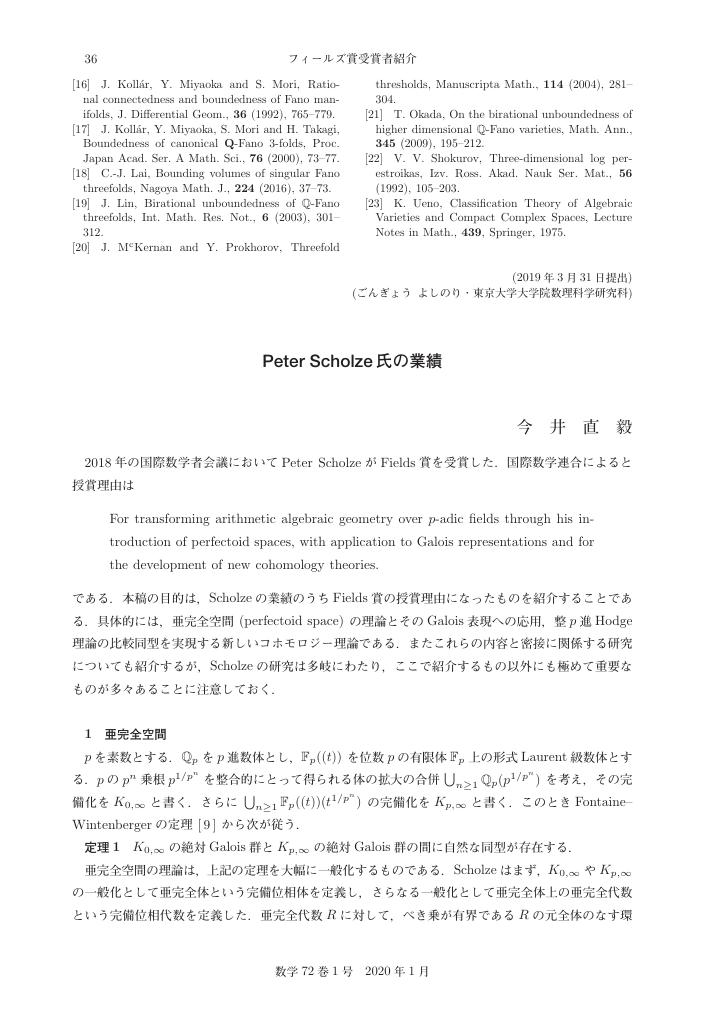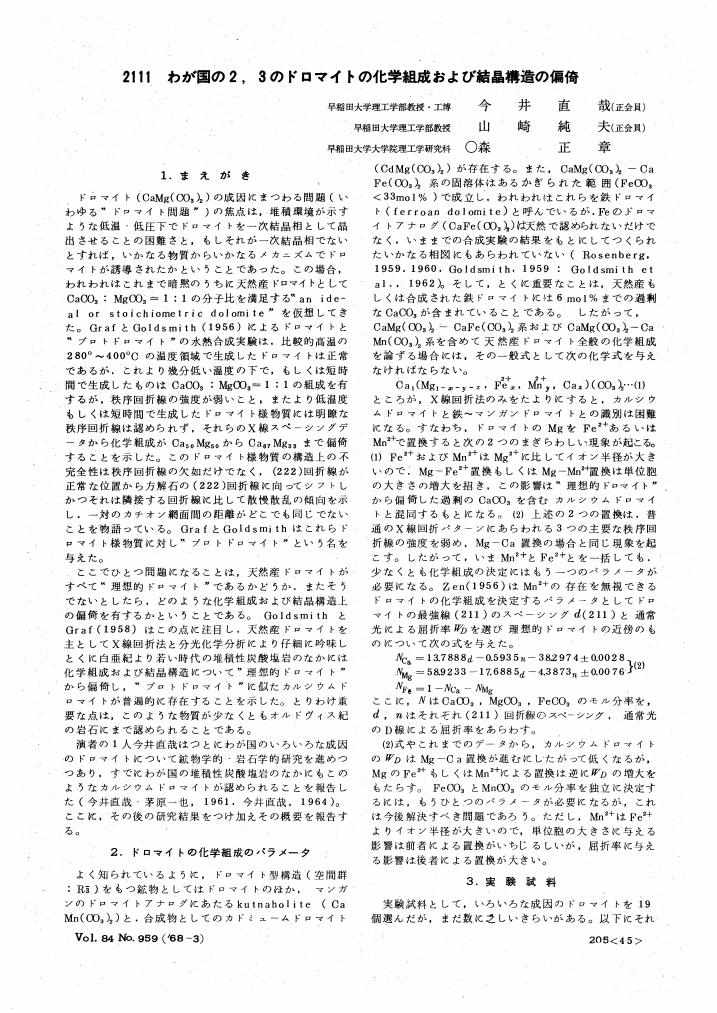4 0 0 0 OA Peter Scholze氏の業績
- 著者
- 今井 直毅
- 出版者
- 一般社団法人 日本数学会
- 雑誌
- 数学 (ISSN:0039470X)
- 巻号頁・発行日
- vol.72, no.1, pp.36-42, 2020-01-24 (Released:2022-01-25)
- 参考文献数
- 25
2 0 0 0 OA 釜石鉱山産グランダイト系ザクロ石のラメラ組織について
- 著者
- 宮下 敦 今井 直哉
- 出版者
- Japan Association of Mineralogical Sciences
- 雑誌
- 岩鉱 (ISSN:09149783)
- 巻号頁・発行日
- vol.89, no.6, pp.227-232, 1994-06-05 (Released:2008-03-18)
- 参考文献数
- 10
Fine lamellar textures with chemical contrast are found in anisotropic grandite garnet from the skarn at the Kamaishi mine, Iwate Prefecture. The lamellae are charaterized by enrichment of iron; i. e., the compositional difference between lamellae and matrix amounts to 5 to 10 mole % in andradite molecules. In the sections sliced normal to (110) faces of garnet, the development of lamellae showing orientation parallel to (111) nearly normal to the growth zoning paralell to (110) face. Furthermore, the fine compositional bands (parallel to (110) growth zoning) are observed cutting the (111) lamellae clearly. The data cannot confirm that formation of lamellae normal to (110) occurs in subsolidus or not. However, the compositional band parallel to (110) is obviously results of subsolidus decomposition.
2 0 0 0 OA プラトンの国家論
- 著者
- 今井 直重
- 出版者
- 奈良学芸大学
- 雑誌
- 奈良学芸大学紀要. 人文・社会科学 (ISSN:04695569)
- 巻号頁・発行日
- vol.11, pp.65-77, 1963-02-28
The aim of this treatise is to clarify the true meaning of Plato's doctrine of ideal state. Plato was not only a great philosopher, but also a political thinker and a highly ambitious person of politics. His dialogues, for instance, State, Law, Statesman, etc. clearly show this fact. Plato has an urgent desire to relieve the people of Athens of the willful and despotic government of ochlocracy. His sincere desire' is to realize idee of justice in the actual, national life. So that, I want to make clear the conception of Plato's justice, and next explain the structure of Plato's ideal state, so-called greek polis state, and then the purpose of national government. The purpose of government, in Plato's doctrine, is to educate and cultivate the people as moral and cultured persons. So the ruler, that is, the governor should be the most educatsd and trained person. He must be a philosopher. This is generally called Plato's government, of philosopher. Plato wanted to put cooperative life into practice in his ideal polis state. So that, he is said as if he were a man of communistic idea. But he was not a communistic thinker. He was far from a communist, and in fact, he was a spiritualist and a lover of idee of kalos kai agathos. He loved, most of all, good, beautiful and purified spirit. He despised material goods, physical treasures. Communists, as a rule, love material goods, above all, and are interested in physical treasures. They are quite materialists. But Plato was not a materialist. He was entirely a spiritualist. He intented to make the people transcend the material wants. For material wants prevent the people from becomming moral and cultured persons. They are great hindrance to improving and establishing the purified personalities of the people.
2 0 0 0 OA GJB2 変異例における進行性難聴の特徴と遺伝子型の検討
- 著者
- 今井 直子 熊川 孝三 安達 のどか 浅沼 聡 大橋 博文 坂田 英明 山岨 達也 宇佐美 真一
- 出版者
- 日本小児耳鼻咽喉科学会
- 雑誌
- 小児耳鼻咽喉科 (ISSN:09195858)
- 巻号頁・発行日
- vol.34, no.3, pp.352-359, 2013 (Released:2014-03-20)
- 参考文献数
- 18
【目的と方法】 先天性難聴の原因として最も頻度が高いのは GJB2 遺伝子変異であり,一般的に非進行性難聴を呈するとされる。今回我々は GJB2 変異97例について遺伝子型と難聴の進行の有無について検討した。【結果】 遺伝子型は従来アジア人に多いとされている235 delC が最も多く,欧米人に多い35 delG は認められなかった。当初からの重度難聴例を除いた41例のうち,1 年以上の間隔で聴力が 2 回以上測定されている症例は32例であった。明らかな難聴の進行例は 1 例,進行疑い例は 3 例であったが,遺伝子型の特定の傾向は認められなかった。【結論】 GJB2 変異においては難聴の進行は稀であり,進行性難聴を呈する特定の遺伝子型は指摘できなかった。しかし乳幼児では特に難聴の程度が言語発達に大きく影響を与えるため,GJB2 遺伝子変異例であっても稀に難聴が進行するということをふまえて注意深く難聴の経過を追う必要がある。
1 0 0 0 OA わが国の2, 3のドロマイトの化学組成および結晶構造の偏僑
- 著者
- 今井 直哉 山崎 純夫 森 正章
- 出版者
- 一般社団法人 資源・素材学会
- 雑誌
- 日本鉱業会誌 (ISSN:03694194)
- 巻号頁・発行日
- vol.84, no.959, pp.205-206, 1968-03-25 (Released:2011-07-13)
1 0 0 0 IR 現行世界各国憲法における主権の構造--比較憲法学的考察
- 著者
- 今井 直重
- 出版者
- 奈良学芸大学
- 雑誌
- 奈良学芸大学紀要 人文・社会科学 (ISSN:04695569)
- 巻号頁・発行日
- vol.10, no.1, 1961-03
This treatise is aimed at the clarifying the structure of sovereign power of several states' constitutions in the world. But at present there are more than one hundred states on earth. So it is very hard to explain that of everyone of them. Widely dividing we can see three groups of states on the globe, that is, they are monarchic state group, federal state group and socialist (peoples' democratic) state group. At first, as monarchic state group, I picked up the constitutions of Norway, Sweden, Belgium, Netherlands, Denmark, The United Kingdom of Great Britain and Northern Ireland and Japan. Next as federal state group, I took up The United States of America, Suitzerland, Mexico, Australia and The Union of the Sovret Socialist Republics. At last, as socialist republic group I dealt with The Union of Soviet Socialist Republics, The Peoples' Democratic Republic of China, Yugoslavia, Bulgaria, Czechoslovakia, Albania, Hungry, Poland, Democratic Peoples' Republic of Korea and so on. In federal republic, generally speaking, sovereign powers are devided between the federal republic and its constituent states. That is to say, some items of its sovereign powers provided by the constitution are vested in the federal republic and the rest powers in each constituent state, and the people of each state. In monarchic states, as a rule, all sovereign powers reside with the monarchs. But as an exception, for example, in Belgium, sovereign powers reside with the people, and the King and the Diet as the highest organ of the state, jointly exercise legislative power. Especially in Japan, sovereign powers reside with the people who is soereign and the Emperor shall perform only such acts in matters of state as are provided for in the constitution and he shall not have powers related to sovereign powers (legislation, administration and judicature).In socialist republics the sovereign powers, without exception, belong to the people, (the people means proletarian people, working people, namely, workers, peasants and intelligentsias) If there are any men who are not proletaria, they are not the people in socialistic meaning and so they are not the sovereign people. So that, they are excluded from the people. But the Diet (the Supreme Soviet of the Union) is the highest organ of the Union and superior to all state organs, that is, the cabinet and the courts of justice. So the Diet directs all other state organs (even the cabinet or- the courts of justice) In this point the socialist republic has a remarkable characteristic.
1 0 0 0 IR 養殖漁場としての的矢湾の低次生産環境特性
- 著者
- 今井 直 太原 英生 河村 章人
- 出版者
- 三重大学生物資源学部
- 雑誌
- 三重大学生物資源学部紀要 (ISSN:09150471)
- 巻号頁・発行日
- no.23, pp.1-12, 1999-12
- 被引用文献数
- 2
1996年7月から1997年9月にかけて的矢湾の低次生産環境要因(水温,塩分,透明度,溶存酸素量,クロロフィルa濃度,硝酸態窒素,亜硝酸態窒素,ケイ酸態ケイ素及びリン酸態リン)の観測調査を行った。その結果,塩分,クロロフィルa濃度及び硝酸態窒素は上層でより大きな季節変動を示したが,溶存酸素量,亜硝酸態窒素及びケイ酸態ケイ素は下層でより大きな変動を示した。また,表層において硝酸態窒素とケイ酸態ケイ素は低塩分時に高濃度を示すことから,河川水の影響を強く受けていることがわかった。これに対し,亜硝酸態窒素とリン酸態リンは,溶存酸素量が少なくなる夏季の下層で高濃度を示すことから,底土表層のバクテリアによる再生が寄与していることが示唆された。クロロフィルa濃度は,河口に近く栄養塩濃度が高い湾奥部よりも河川水の影響が比較的弱い水道部において高濃度を示した。また,本研究の調査結果と既知のカキとアコヤガイの生息環境の好適・不適条件を比較すると,的矢湾の湾奥部はカキと真珠の養殖漁場としては不適環境になる可能性のあることが示唆された。
- 著者
- 今井 直 堤 康央 長野 一也 杉田 敏樹 吉田 康伸 向 洋平 吉川 友章 鎌田 春彦 角田 慎一 中川 晋作
- 出版者
- 日本プロテオーム学会(日本ヒトプロテオーム機構)
- 雑誌
- 日本プロテオーム学会大会要旨集
- 巻号頁・発行日
- vol.2007, pp.151, 2007
現状のプロテオーム解析では、疾患組織あるいは対照となる健常組織由来の蛋白質サンプルを二次元ディファレンシャル電気泳動(2D-DIGE)法で分離した後に、質量分析計を用いて個々の発現変動蛋白質を同定することにとどまっている。そのため、同定された膨大な数の変動蛋白質の中から、発現や変動を詳細に機能解析することで、病態の発症や悪化に中心的な役割を果たしている創薬ターゲット・蛋白質を効率よく絞り込むこが次のステップとして期待されている。その点において、ELISAなどの抗原-抗体反応を利用した解析手法は、特定蛋白質を特異的かつ高感度に検出できることから、プロテオミクス研究においても蛋白質の機能解析を進める上で極めて有用である。しかし、従来のように数十g以上の蛋白質を動物個体に免疫する必要があるハイブリドーマ法では、上述の2D-DIGEによって得られる極微量(数十ng程度)かつ多種類の蛋白質サンプルに対する抗体作製に対応することは不可能である上、この方法ではプロテオミクスの最大の利点である網羅性を著しく損なってしまう。そこで我々は、これらの課題を克服するために、ファージ抗体ライブラリと2D-DIGE法を組み合わせた新しいモノクローナル抗体(Mab)作製技術の確立を試みた。一般に、ファージ抗体ライブラリからのMabのセレクションは、プラスチックプレートなどに固定化した数g~数百g程度の標的抗原に対してファージ抗体ライブラリを反応させ、抗原に結合するファージのみを選択・増幅する、という方法(パンニング法)を用いる。既に我々は、ニトロセルロースメンブランを固相化担体として利用することで蛋白量がわずか0.5 ng程度であっても効率よくMabを選別できるパンニング法の開発に成功している。今回は、ヒト乳癌・乳腺細胞株の2D-DIGE解析により得られた発現変動スポットから蛋白質を抽出し、この蛋白質をダイレクトに抗原として用い、メンブランパンニングを行った。その結果、メンブランパンニング法を適用することで、今回得られた全てのスポットに対してMAbを単離することが出来た。以上、2D-DIGEによる変動蛋白質の同定と抗体作製を一挙に達成できる本手法は、プロテオミクスによる創薬ターゲットや疾患の早期診断・治療マーカーの同定に大きく貢献するものと期待される。
1 0 0 0 吉田一枝先生を偲ぶ
- 著者
- 今井 直重
- 出版者
- 日本法政学会
- 雑誌
- 法政論叢 (ISSN:03865266)
- 巻号頁・発行日
- vol.11, pp.1-3, 1975
1 0 0 0 主権の構造
- 著者
- 今井 直重
- 出版者
- 日本法政学会
- 雑誌
- 法政論叢 (ISSN:03865266)
- 巻号頁・発行日
- vol.12, pp.20-30, 1976
1 0 0 0 IR 主権の構造
- 著者
- 今井 直重
- 出版者
- 大谷学会
- 雑誌
- 大谷学報 (ISSN:02876027)
- 巻号頁・発行日
- vol.32, no.2, pp.16-34, 1952-11
1 0 0 0 IR アメリカ合衆国憲法における人民権
- 著者
- 今井 直重
- 出版者
- 奈良学芸大学
- 雑誌
- 奈良学芸大学紀要 (ISSN:0369321X)
- 巻号頁・発行日
- vol.5, no.1, 1956-04
1 0 0 0 憲法第七条における「国民のために」の意義
- 著者
- 今井 直重
- 出版者
- 日本法政学会
- 雑誌
- 法政論叢 (ISSN:03865266)
- 巻号頁・発行日
- vol.13, pp.1-12, 1977
1 0 0 0 教育の理念としてのヒューマニティ
- 著者
- 今井 直重
- 出版者
- 日本法政学会
- 雑誌
- 法政論叢 (ISSN:03865266)
- 巻号頁・発行日
- vol.11, pp.A1-A7, 1975
1 0 0 0 憲法改正の限界
- 著者
- 今井 直重
- 出版者
- 日本法政学会
- 雑誌
- 法政論叢 (ISSN:03865266)
- 巻号頁・発行日
- vol.19, pp.1-9, 1983
This treatise comments the limit of the revision of the constitution of a state. First of all, we must distinguish the difference between the establishment of the constitution and its revision or amendment. The constitution-making power is an absolutely unlimited power and can establish any constitution that the state wants. But different from the constitution-making power, the constitution-revising competence is necessarily restricted by the principles and inherent spirit of the positive constitution of the state. Why the reason? Because we must, first of all, know the different charactor between the constitution-making power and constitution-revis-ing competence. That is, as a famous French constitutionalist, Si-eyes, 18ct., said, constitution-making power is an unconditional, unlimited, creative power (pouvoir constituant) and cannot be limited or conditioned by any other powers. But being distinguished from this, constitution-revising competence is merely a right in the region establishied by the constitution. So, to make the point clear, I will explain the purport as follows.- (1)Constitution-making power (pouvoir constituant) is creative, original and inherent power and cannot be limited by any other powers and so it is unlimited. (2)Constitution-revising competence (pouvoir constitue) is only a right of positive law and it is only a competence and cannot be
1 0 0 0 IR 法の理念的性格について
- 著者
- 今井 直重
- 出版者
- 奈良学芸大学
- 雑誌
- 奈良学芸大学紀要 (ISSN:0369321X)
- 巻号頁・発行日
- vol.1, no.1, pp.39-49, 1951-03
1 0 0 0 IR 国民主権の意義
- 著者
- 今井 直重
- 出版者
- 奈良学芸大学
- 雑誌
- 奈良学芸大学紀要 (ISSN:0369321X)
- 巻号頁・発行日
- vol.1, no.2, pp.82-90, 1952-03
1 0 0 0 IR 主催概念の史的発展
- 著者
- 今井 直重
- 出版者
- 奈良学芸大学
- 雑誌
- 奈良学芸大学紀要 (ISSN:0369321X)
- 巻号頁・発行日
- vol.4, no.1, 1955-04
1 0 0 0 ソ同盟憲法に於ける国家機構について--民族主義的考察
- 著者
- 今井 直重
- 出版者
- 大阪商業大学商経学会
- 雑誌
- 大阪商業大学論集 (ISSN:02870959)
- 巻号頁・発行日
- no.1, pp.90-110, 1952-04
1 0 0 0 IR 天皇の象徴的性格
- 著者
- 今井 直重
- 出版者
- 大谷学会
- 雑誌
- 大谷学報 (ISSN:02876027)
- 巻号頁・発行日
- vol.34, no.3, pp.59-77, 1954-12

